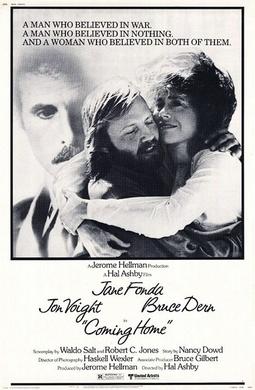
"Coming Home" begins with a scene in a small room, where some men are playing pool and having a drink. As if we're intruding, we catch them in the middle of a discussion about the Vietnam War. One of them claims that they would go back and fight if given the chance, out of a moral obligation to uphold justice in that country. The others are in disagreement, appalled that a veteran would come back with such a positive view. It's a very casual scene that stands apart from the rest of the plot, but it signifies director Hal Ashby's approach to the film. By the time of the film's release in 1978, public sentiments towards America's involvement in Vietnam had already soured. Under Ashby's direction, "Coming Home" thus feels like a film that simply joins the conversation, rather than mounting its own angry anti-war platform.
Following the prologue, we are introduced to two of our main characters - Bob and Sally Hyde. Bob (Bruce Dern) is a captain in the Marine Corps who is about to be deployed to Vietnam, leaving behind his wife Sally (Jane Fonda). Bob is enthusiastic about his departure while Sally is understandably sad, dreading the impending loneliness. She's a typical conservative housewife and therefore has a lot of time on her hands. To combat the idleness then, she decides to volunteer at the local veterans' hospital. It's there that she meets former classmate Luke Martin (Jon Voight), now a paraplegic due to injuries sustained in the war. Initially antagonistic and bitter about his predicament, his demeanor gradually softens with the aid of Sally. Soon, a romantic relationship develops that creates a difficult love triangle.
As mentioned earlier, "Coming Home" is a more subdued film than its counterparts (fellow Best Picture nominee "The Deer Hunter" for example). It's less a protest than it is an ethnography. All of its characters are wounded by the war, physically, emotionally and psychologically. In essence then, the film is a lucid examination of their varied recovery methods. Some find comfort in their relationships with friends and family, while others are simply overwhelmed. It's something that the script taps into beautifully.
Indeed, Ashby's direction is remarkable primarily for what it doesn't do. "Coming Home" feels like a "writer's film", in that it places utmost trust in the power of its words. It's never emphasized with poignant shots or emphatic performances. Ashby just gives it to you straight.
Where you do feel his influence is in the soundtrack. Known for his brilliant song choices in other films, he brings that same musicality here. Tracks like Simon and Garfunkel's "Bookends" infuse the film with his trademark warmth, capturing the beautiful spirit of the people. Though the war was of national importance, the film is very intimate in scale.
That intimacy is never more apparent than when our central lovers are on screen together. In keeping with the tone of the film, Fonda and Voight give wonderfully low-key performances. Fonda is particularly eye-opening. As an actress who I associate with fiercely independent characters (as well as her liberal "Hanoi Jane" personality), I was pleasantly surprised at how effectively she pulled off this "homely" role. She has the perfect match in Voight too, making their evolving romance feel incredibly organic and realistic. Bruce Dern also makes a strong impression, especially in the film's later scenes.
"Coming Home" may not have the same impact for modern audiences as more hard-hitting cinematic accounts of the Vietnam War, but it's an essential part of the canon. The captivating performances, moving story and excellent soundtrack make for a rewarding viewing experience. It deserves to be rediscovered by cinephiles today.
This film is part of The Matinee's Blind Spot series.
























